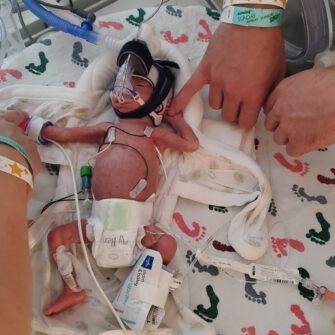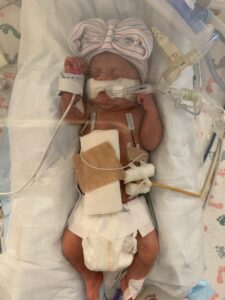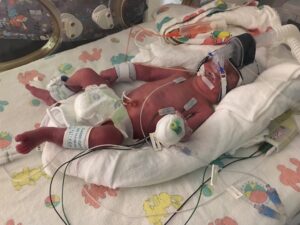
Celebrating NICU families
Welcoming a new baby is an exciting time for most parents-to-be. Decorating the nursery, taking pregnancy photos, choosing a name, and opening gifts at baby showers are joyful moments that many look forward to during pregnancy.
NICU (neonatal intensive care unit) families, however, may miss some of these experiences, which can become a source of grief. When babies are born pre-term and admitted to the NICU, the anticipation of a new life is quickly replaced with fear and uncertainty.
Will the baby survive? Will the baby face long-term complications? How long will the baby need to stay in the hospital? When will the baby meet family and loved ones?
November 17 is recognized as World Prematurity Day and we’re sharing stories that celebrate the strength of the many families who have graduated from the Mary Bridge Children’s Level IV NICU. Thank you to the NICU alumni who shared their perspectives and stories with us.
- Lisa, mom to twins Kash (20 weeks gestation) and Kolton (23 weeks, 3 days gestation)
- Mariah, mom to William (25 weeks gestation)
- Kammie, mom to Kambria (27 weeks, 5 days gestation)
- Liz and Brett, parents of Gracelyn (30 weeks gestation)
- Irina, mom to Elda (25 weeks, 5 days gestation)
- Kelsey and Curtis, parents of Cooper (25 weeks gestation)
Highest highs and lowest lows
Navigating a NICU stay is a strenuous and emotional rollercoaster. The unexpected nature of having a premature or critically ill baby brings a sense of loss — not just of the anticipated birth experience but also of normalcy.
“The NICU is both a terrifying and beautiful place. I consider that team a blessing in our lives,” says Kammie, whose daughter Kambria spent 135 days in the NICU. “I had Kambria one and a half months before my baby shower, never had pregnancy photos and had to wait 34 days before I could even hold her.”

Kambria spent 135 days in the NICU.
Torn between maintaining hope and confronting difficult realities, including quickly becoming medical experts and advocates for their tiny babies, life for NICU families brings unexpected grief and heartbreak.
“I’d come home every night and bawl my eyes out. But at the NICU, I tried to stay strong,” said Kelsey, whose son Cooper spent 111 days in the NICU. “I mourned not being pregnant anymore. Coming home without a baby was excruciating, and I felt like I didn’t even want a baby shower because I wasn’t pregnant anymore and couldn’t have my baby with me. It was a huge wave of emotions going through me.”
Even when babies are too delicate to be held on demand, NICU parents cherish the things that often become monotonous — diaper changes, feedings and opportunities to have skin-to-skin contact (known as kangaroo care). Complications are commonplace in the NICU, but these parents dig deep for the strength — both for themselves and for their babies.
“My daughter coded twice in front of me. My only goal was for us to get through the day,” said Irina, whose daughter Elda spent 125 days in the NICU. “Seeing her so fragile, hooked up to so many tubes, was the hardest thing I’ve ever experienced.”
“I was so nervous. He was 3 days old and so tiny that he fit between my chest,” recounts Lisa, whose surviving twin son Kolton spent 125 days in the NICU. “I appreciate their confidence and comfort level to give parents that experience, to bond with their baby who’s living in an incubator.”
Kolton graduated from intubation to a CPAP machine and underwent eye surgery for retinopathy of prematurity (ROP), an eye disease that affects preemies. He still finds comfort sleeping with something touching his face, like his tiny stuffed cow.
Leaning on others for support
Intense fear is a common emotion many NICU families experience. Thankfully, with dedicated multi-disciplinary teams available around the clock, families are supported through thick and thin. For many of them, their NICU doctors, nurses, therapists and social workers become extensions of their family, oftentimes offering a warm hug or a shoulder to cry on, serving both as a medical resource and an emotional support.

Cooper spent 111 days in the NICU.
“[I] can’t say enough about NICU nurses and doctors. You’re in the scariest place in life and everyone’s in it to win it with you,” says Curtis. “In the beginning I had a feeling of wanting to do something to fix the situation but realized that I had no control. Despite a little defeat because I couldn’t do anything, the team was phenomenal at giving me information I needed but keeping information that wasn’t crucial to know away from me.”
“Our nurses were phenomenal,” says Liz, whose daughter Gracelyn spent 56 days in the NICU. “We weren’t prepared and couldn’t decide on a name. One nurse joked that after a week, the nurses get to name the baby. While it started as a joke, they set up a whiteboard voting system to help us choose Gracelyn’s name. Things like this provided levity during a stressful time.”
For Kammie, learning the NICU nurse schedules was one way for her to feel more at ease when she couldn’t physically be with Kambria. She says she’d call every day and throughout the night, checking up on Kambria and getting the nurses’ reports before shift change.
Celebrating collective wins
One of the first things NICU parents find is camaraderie with other families as they learn how to care for their infant, how to cope and how to lighten each other’s load.
“Parenting Partnership and social activities with other NICU parents helped us feel not so alone,” says Liz. “Even though I had an older baby, things like breastfeeding a tiny baby can be so scary. That feeling of isolation was made easier, [when we felt] like we had a community.”

Gracelyn spent 56 days in the NICU.
Between the other parents, educational get-togethers and their multidisciplinary care teams, there is never a moment when these families are alone in their journey. That’s why services, including Parenting Partnership, are available for families up to three years after their baby is discharged from the hospital.
“It’s so nice for families to be able to connect with one another; we’re also available to provide resources, sometimes we’re able to help with funding or helping with things like additional treatment aids that are recommended,” says Meschell Miloscia, Mary Bridge Children’s NICU social worker. “We do home visits and community or doctor’s visits — we want to support them where they’re at. We offer a monthly, virtual family support group and summer meetups in outdoor places like parks.”
When medical interventions, like his son Cooper had for a brain bleed, proved too stressful, Curtis would step out for fresh air. He found solace reading the stories posted in the hallways of NICU graduate families who were once in his shoes. While there, he’d bump into other parents facing a similar situation.
“You start to see the same parents at events, you start small-talking, and soon you’re talking about your kids and seeing each other graduating from NICU,” Curtis says. “There’s a shared excitement and hope for all of the kids. Life is going on outside the NICU, but everyone in there was doing it together.”
Once these families can release their expectation of normal and focus on small day-to-day wins, they shift from harried to hopeful. That expanded emotional capacity helps them appreciate the individual personalities taking shape in each incubator, separate from their child’s developmental milestones.
“It feels like a blur, but time really does pick up and slow down,” shares Mariah, mom to William, who was born at 25 weeks. “Whatever the situation is, it happens for a reason; knowing whatever you’re doing, as long as you’re doing your best, that’s good enough. You have to take care of yourself, too, even when it’s hard. There are things that people/spouses will understand and some things that they won’t or can’t understand.”
A few more words of advice from graduate families:
- Take time to process and document your child’s journey. It’s OK to grieve the things you thought you’d experience the “traditional” way.
- Focus on progressive improvement instead of fixating on percentiles, growth curves or discharge dates.
- Reach out to other families on the unit and ask your care teams for resources and support.
- Don’t be afraid to advocate for your child in the NICU and beyond.
- Teach your kids that it’s OK to ask questions about others who look different than they do; it’s not OK to stare at people or just ignore them.
Care on the homefront
The excitement of homecoming is equally loaded with anxiety as parents transition from the sterile, measured environment that helped their infant survive. Even for Lisa, who is a nurse, bringing Kolton home was scary, especially as he was the first infant Mary Bridge Children’s discharged with a nasogastric tube.
“It’s terrifying to go home because you don’t have that safety net,” says Liz. “Parents are anxious to get home, but babies will go home when they’re healthy and have the best chance to thrive at home. It will be hard, but they’re little fighters for a reason.”

Gracelyn graduated from preschool and loves learning.
With time, memories of the fragile days in the NICU are outnumbered by celebratory firsts at home.
“Elda has lots of energy and is very mobile and curious; very sassy and extremely independent,” says Irina.
“William today is a great kid. He’s a jokester and is a perfect mix of loving and feisty — he’s a big brother now,” says Mariah.
“Kolton was known as a fighter, and today he’s the most stubborn little kid,” says Lisa. “He still sees PT and OT for fine motor skills, speech and audiology for minor hearing loss, and will soon get glasses for ROP. He still has obstacles, but he’s now walking with orthotics, just learned to ride a bike and loves to be outside.”

Kambria loves preschool and is growing and thriving.
“The doctors weren’t sure Kambria was going to make it, but she just turned 4 years old this month,” says Kammie. She’s in her second year of preschool and doing amazing things every day. She doesn’t let anything stop her.”
Mary Bridge Children’s Hospital is honored to nurture babies who defy the odds and their families who support them every step of the way.
Follow along as we share more about these NICU graduates and celebrate those like them, who got tiny starts and are moving on to do big things in life.